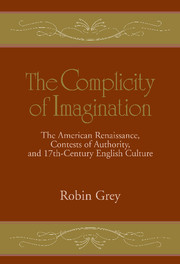 The Complicity of Imagination
The Complicity of Imagination Book contents
- Frontmatter
- Contents
- Acknowledgments
- Cambridge studies in American Literature and Culture
- Introduction: Antebellum America and the Culture of Seventeenth-Century England
- 1 Cultural Predicaments and Authorial Responses
- 2 “A Seraph's Elequence” Emerson's Inspired Language and Milton's Apocalyptic Prose
- 3 Margaret Fuller's “The Two Herberts,” Emerson, and the Disavowal of Sequestered Virtue
- 4 “As if a green bough were laid across the page”: Thoreau's Seventeenth-Century Landscapes and Extravagant Personae
- 5 Melville's Mardi and Moby-Dick, Marvelous Travel Narratives, and Seventeenth-Century Methods of Inquiry
- 6 Surmising the Infidel: Melville Reads Milton
- Notes
- Index
- Cambridge Cultural Social Studies
6 - Surmising the Infidel: Melville Reads Milton
Published online by Cambridge University Press: 05 November 2009
- Frontmatter
- Contents
- Acknowledgments
- Cambridge studies in American Literature and Culture
- Introduction: Antebellum America and the Culture of Seventeenth-Century England
- 1 Cultural Predicaments and Authorial Responses
- 2 “A Seraph's Elequence” Emerson's Inspired Language and Milton's Apocalyptic Prose
- 3 Margaret Fuller's “The Two Herberts,” Emerson, and the Disavowal of Sequestered Virtue
- 4 “As if a green bough were laid across the page”: Thoreau's Seventeenth-Century Landscapes and Extravagant Personae
- 5 Melville's Mardi and Moby-Dick, Marvelous Travel Narratives, and Seventeenth-Century Methods of Inquiry
- 6 Surmising the Infidel: Melville Reads Milton
- Notes
- Index
- Cambridge Cultural Social Studies
Summary
As seen in Chapter 1, Evert Duyckinck and Fitz-James O'Brien were uneasy with Melville's Brownean “extravagant speculations.” In the way that Melville reads John Milton, as we shall see next, their suspicious seem well founded. In fact, in responding to Milton (perhaps at a later date than his reading of Browne), Melville himself seems increasingly frustrated with the instances of epistemological opacity he encountered, and now vindictively heightens the instances of inscrutability of which he thinks Milton was also aware. In Melville's annotations of Milton's poetry, we are confronted with a curious reading of Milton's ambitions and agenda, one that seems to be significantly self-reflexive for Melville. Indeed, these annotations offer the opportunity of viewing some of Melville's own subversive techniques as they are projected onto another author, and confirm, to some extent, his contemporary critics' suspicions of him. Dating from his readings of Milton in 1849, 1860, and 1868, Melville's unpublished annotations reveal that he was a highly engaged and frequently ingenious reader of the poetry. From these annotations it is possible to infer that Melville rather startlingly regards Milton himself as the “Sampson,” who, in Andrew Marvell's famous words, “grop'd the temple's posts in spite,” intent upon bringing down the entire Christian theological edifice. Neither an Orthodox Calvinist, a radical Puritan revolutionary, nor a heretical Manichean, Milton, according to Melville's annotations, covertly displays a much darker, more doubting, and more insinuating investment in Christian theology than the Anglican editor of Melville's edition, the Reverend John Mitford, ever guesses.
- Type
- Chapter
- Information
- The Complicity of ImaginationThe American Renaissance, Contests of Authority, and Seventeenth-Century English Culture, pp. 213 - 228Publisher: Cambridge University PressPrint publication year: 1997
